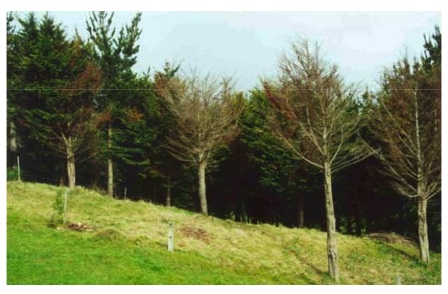PESTS AND DISEASES OF FORESTRY IN NEW ZEALAND
Cypress canker screening programme - sample request
Scion is the leading provider of forest-related knowledge in New Zealand
Formerly known as the Forest Research Institute, Scion has been a leader in research relating to forest health for over 50 years. The Rotorua-based Crown Research Institute continues to provide science that will protect all forests from damage caused by insect pests, pathogens and weeds. The information presented below arises from these research activities.
From Forest Health News 112, October 2001.
Forest Health is teaming up with the New Plantation Species Group, Forest Research, in an attempt to find and make available cypress material that is less susceptible to cypress canker disease, besides being desirable in other characteristics, such as rapid growth and fine branching.
 This ailment, caused by two species of fungi, Seiridium unicorne and S. cardinale , is particularly prevalent on Cupressus macrocarpa, and is one of the main factors limiting the use of this desirable species in rural woodlots and forest plantations throughout the country (FHNews 87: 2). Seed of C. macrocarpa has already been collected from a range of families, and stool beds are being set up in the Forest Research nursery to provide cuttings for field trials, which will be established and managed by Charlie Low and Jacqui Halliday, under the overall direction of Luigi Gea. Forest Health will screen additional cuttings from the same stool beds by testing their response to inoculation with strains of the cypress canker fungi.
This ailment, caused by two species of fungi, Seiridium unicorne and S. cardinale , is particularly prevalent on Cupressus macrocarpa, and is one of the main factors limiting the use of this desirable species in rural woodlots and forest plantations throughout the country (FHNews 87: 2). Seed of C. macrocarpa has already been collected from a range of families, and stool beds are being set up in the Forest Research nursery to provide cuttings for field trials, which will be established and managed by Charlie Low and Jacqui Halliday, under the overall direction of Luigi Gea. Forest Health will screen additional cuttings from the same stool beds by testing their response to inoculation with strains of the cypress canker fungi.
There are still many imponderables, and Helen Tsatsia, a student from Massey University, will be exploring the inoculation and infection process as part of a post-graduate diploma. This may also include some initial work using cypress tissue culture material.
One of the key issues in this project is the degree of pathogen variability, and some of the initial work will involve an investigation of the virulence of a range of cultures of both fungi. To do this we will need samples of cankered branches from which the fungi can be isolated.
We therefore request samples of cypress branches with good fresh vigorous cankers from diseased trees in all parts of the country. Cankers are sunken, flattened regions, often purplish and resinous, present on branches with browning and dying foliage. Please cut and place the branch segment in a plastic bag, and forward as rapidly as possible to:
Judy Gardner, Forest Research, Private Bag 3020, Rotorua.
Please also include a few brief details such as location, host, age, and contact information (eg. phone number or email address). Samples may be sent at any time over the next three-four months. Your assistance is much appreciated. For further information, please contact:
ian.hood@forestresearch.co.nz or judith.gardner@forestresearch.co.nz.
This information is intended for general interest only. It is not intended to be a substitute for specific specialist advice on any matter and should not be relied on for that purpose. Scion will not be liable for any direct, indirect, incidental, special, consequential or exemplary damages, loss of profits, or any other intangible losses that result from using the information provided on this site.
(Scion is the trading name of the New Zealand Forest Research Institute Limited.)

 Farm Forestry New Zealand
Farm Forestry New Zealand

